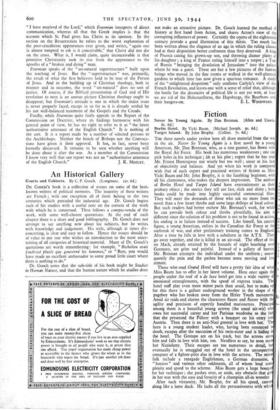An Historical Gallery
Courts and Cabinets. By C. P. Gooch. (Longmans. I2S. 6d.)
DR. GOOCH'S book is a collection of essays on some of the best- known writers of political memoirs. The majority of these writers are French ; with one exception all of them belong to the two centuries which preceded the industrial age. Dr. Gooch begins each of his studies with a useful note on the context of the work with which he is concerned. Then follows a compte-rendu of the - work, with some well-chosen quotations. At the end of each chapter there is a short and good bibliography. Dr. Gooch does not attempt to say anything new about his subjects, but he writes with knowledge and judgement. His style, although at times dis- concerting, is clear and easy to follow. Hence the essays should be of value to any one who wishes an introduction to the most enter- taining of all categories of historical material. Many of Dr. Gooch's quotations are worth remembering : for example, "Richelieu avait foudroye pluteit que gouverne les hommes," or " Bute, you would have made an excellent ambassador to some proud little court where there is nothing to do."
Dr. Gooch notes that the sub-title of his book might be Studies in Human Nature, and that the human nature which he studies does
not make an attractive picture. Dr. Gooch learned the method of history at first hand from Acton, and shares Acton's view of the corrupting influences of power. Certainly the courts of the eighteenth century provide a good illustration of this thesis. Too much has been written about the elegance of an age in which the ruling classes had at their disposition better craftsmen than they deserved. A king of Prussia caning his grown-up son, and throwing dinner plates at his daughter ; a king of France eating himself into a torpor ; a Tsar of Russia " bringing the desolation of Jerusalem " into the palace where he was a guest. These are but a few pictures of the human beings who moved in the fine rooms or walked in the well-planned gardens to which time has now given a spurious romance. A study of the " enlightened despotism " only confirms Carlyle's view of the French Revolution, and leaves one with a sense of relief that, although the battle for the decencies of political life is not yet won, at least we are rid of the Hohenzollerns, the Hapsburgs, the Bourbons and






























 Previous page
Previous page